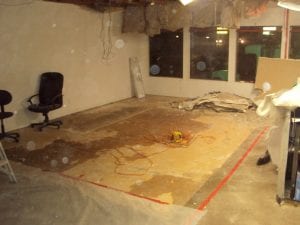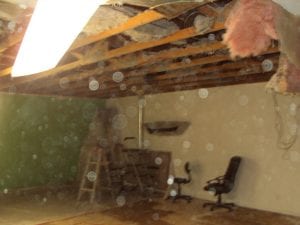This month, 9 years ago, my wife and I brought home our first born. And guess where the first place we stopped was? Our flooded business whose ceiling had collapsed.
In addition to owning SEO National, years back I built a salon for my wife, Gossip. She’s a licensed cosmetologist so I wanted to bring her into the world of entrepreneurship.
We’ve since sold the salon and I love seeing it still in business six years later. But back at the hospital, 6-foot me was laying stretched out on the 4-foot hospital couch, snuggling our new son. If you’ve ever slept in a hospital room, you know what I’m talking about. We had finished checking out of the hospital and were waiting for the doctor to discharge us any moment, then my phone rang.
“Uh, the ceiling is dripping water.” Said one of our stylists.
I told them to finish what they were doing, get their clients out, and close the salon. Less than an hour later they called to tell me that the ceiling had collapsed.
Water leak.


Business insurance covered all of the physical damage. What I didn’t mention was that, at the time, I had SEO National’s office in the suite next door so I could babysit the fledgling salon. Thanks to me having backups, no digital data was lost either.
One business takeaway that I always remember learning from this is the importance of redundancy. Even though no data was lost, that opened up my eyes to how quickly disaster can strike. So now I keep backups of backups of backups.
Really.
Our computers backup to Dropbox. They also backup locally to external hard drives. And those external hard drives backup automatically to Backblaze. Our servers also have backup drives, which also backup remotely to external recovery points.
I would way rather pay a few extra hundred bucks here and there for total peace of mind than to try to save a few bucks and always have a potential vulnerability waiting that would cost infinitely more money in downtime and lost revenue if the perfect storm ever struck.
13 years into business, we’ve never had any downtime due to lost data. Wild to look back on now though.
Back in 2013, Dell had a column called TechOne. They asked me about this flood experience. Here is what I shared with them back then.

Table of Contents
Although unlikely, natural disasters do occur. Is your company prepared and if so what key elements of your disaster recovery plan ensure that data is not lost?
We are prepared. All client hosted websites are managed through a co-location vendor. Their facility ensures 24/7 monitoring, disaster resistant efforts (backup generators, waterproofing facilities, caged setups for earthquake mitigation, etc.).
All client campaign assets that we use on our local network are backed up to external hard drives. Those are then backed up to Dropbox. Our Dropbox is then backed up to a remote cloud storage vendor, Backblaze. Additionally, all computers backup directly to Backblaze too.
How do you distinguish between data stored remotely and on-site when it comes to securing data to cover all possible events?
We take an all-inclusive approach. Everything is backed up locally. However, in case of a flood or the place burns down, all local backups are also backed up remotely.
Are cloud providers considered in the recovery plan, considering that they could also experience a natural disaster? Are their disaster recovery plans a factor in provider selection?
We backup everything locally and to the cloud. That way, if one resource goes down than we have the other. Should a perfect storm occur, we have all backups backed up to a secondary cloud provider at all times too.
Disregarding the human factor involved, how much time would it take to resume normal business if the worst occurred?
Our operations are very detail oriented. The processes that we have developed have become irreplaceable. Should all data resources be wiped out, loss would be immeasurable.
We have a streamlined process that is ingrained in our fulfillment nowadays, so fulfillment could continue. However, the loss of historical data could cause unnecessary duplication in workloads that have already been completed. I would estimate it would take at least a year to recreate all previous documentation while balancing on-going fulfillment.
When our flood occurred it was during some of our startup years. At that point, our operations were incredibly fragile to any loss. We would have survived without backups, but progress and growth could have been significantly impacted.
The floors were new, as we remodeled when we originally took the lease. The laminate floor were a complete loss. We had also installed new track lighting upon original move-in. Physical damages, even for how small we were then, still went into the thousands, into 5 figures.
To make things worse, the flood occurred on the day my first child was born. We received a call the morning were were preparing to head home from the hospital. The first place my wife and new son got to see after leaving the hospital was a quick stop at the office to assess the damages. The next few weeks were intense, but knowing we could still operate after the facility was restored certainly eased overall stresses.
Any recommendations for SMEs when it comes to disaster recovery plans?
You can never be too safe. The extra cost to cover something that may never happen can often be a tough expense to swallow. However, if that “if” occurs, you could lose your entire business product over night. Literally. Backup locally. Back that up remotely. Then acquire a source for secondary backups. You’d be surprised how likely it is for the “unlikely” to happen.
Do you feel your company is adequately prepared for a natural disaster? How could you be more prepared? Cite examples and redundancy options.
I truly believe we are among the few that are fully prepared for any sort of disaster prevention. All of our data is backed up. We even go so far as having redundant internet connections at our office. Should one ISP experience downtime, we have another full speed internet provider.
